Economic Constraint Crystalizes SLAC
Demand for Legal Aid Growing Rapidly
A growing unemployed middle class was putting additional pressure on legal aid clinics. It was estimated that approximately a third of people seeking legal aid in Saskatoon were being turned away from service. The demand was expected to increase as more and more people’s unemployment insurance ran out and the number of welfare recipients grew.
The Saskatoon legal aid clinic had received an increase in the number of debt-related civil cases, including home foreclosures and bad debts. There was also a trend with increased family disputes and the breakdown of marriages – additional signs of financial stress – as well as landlord-tenant disputes.
The Prince Albert legal aid clinic also reported and increase in files – over the course of two years the caseload of staff lawyers had more than doubled to an average of 286 new files per lawyer per month. Province-wide, the 60 legal aid staff lawyers dealt with 26,000 files in the 1981-82 fiscal year.
MacPherson Report on Legal Aid Released
Judge MacPherson completed his review of the Saskatchewan legal aid program. His findings noted that the plan is overall a satisfactory program, however the administrative side of the organization needed significant improvements. He recommended the program work more business-like by removing some responsibilities of the local boards.
The report also noted that the lack of central coordination or oversight of local boards has led to some problems, such as moonlighting by lawyers, over-preparation for court, or excessive travel expenses.
Other recommendations included:
- each legal director is to be accountable to the Commission, in hopes this would improve service;
- have in place two legal directors in the Regina and Saskatoon offices to keep up with the expanding workloads (one director for civil law, one for criminal);
- establish training courses for paralegals to ensure consistency from office to office;
- giving the Commission power to recover money spent on those who are ineligible for legal aid but received services;
- increasing spending on private bar farm-outs so that private bar lawyers also gain experience in criminal law cases;
- moving offices out of corporate buildings and into working-class neighbourhoods, closer to the people the clinics are serving and therefore more accessible.; and
- changing the method of appointments to the Commission, making government appointments the minority.
Response to MacPherson Report Recommendations
Saskatchewan’s Attorney General, Gary Lane. supported Judge MacPherson’s recommendations, noting the changes could save as much as $1 million from the $6 million annual budget to legal aid.
Chair of the Saskatoon Community Legal Services Board, Greg Walen, said the restructuring of area boards would strip local people of their current power to decide what kind of services are needed by poor people of the community, which was one of the reasons the program was first introduced. From his perspective, having local boards oversee the lawyers was more advantageous than having a central board manage everything.
Parkland Legal Services Inc. disputed almost every recommendation of the report. The board said implementing the recommendations would result in a regressive step in the development of Indigenous -non-Indigenous relationships. Six of Parkland’s board members were Indigenous and would have their say reduced if the board became advisory only.
The Saskatchewan Association of Community Legal Services issued a press release that said: “As area boards, we are offended at the inadequacy of the process of review and, indeed, feel that the process falls far short of the requirements spelled out in the letter of instruction to MacPherson from Lane.”
The association asked the Attorney General to hold off on the recommendations until he received more public response to the report. They also criticized the fact that the report did not review legal aid services to Indigenous people.
Bev Schermann, president of the Canadian Union of Public Employees and spokesperson for 105 unionized legal aid employees, said the proposed $1 million savings is only achievable through staff reductions, which would mean a reduction of services to the poor and Indigenous people.
Public Meeting Draws MacPherson Critics Together
A public meeting took at the Saskatoon library, sponsored by the Saskatoon Legal Assistance Clinic, Self-Help Council, Saskatoon Clinical Lawyers Association, Regina’s Community Legal Services Society, the Urban Core Network, and the Saskatoon Saskatchewan Law Union. The crowd of approximately 100 people was critical of the MacPherson Report, particularly:
- with stripping local boards of power and centralizing decision-making;
- of who MacPherson consulted during the review; and
- of the recommendation to have two indigenous people on the Commission, because that was fewer than there was and would be considered tokenism. Natives are the majority of clients so need strong representation.
Melanie Lautt, a professor at the University of Saskatchewan, put forward a motion that the Attorney General’s department ensure community-based boards are maintained, and another motion for a legal aid review that included input from representatives of persons served by legal aid. They were both unanimously approved
Criticism of Legal Aid Recommendations Heard Throughout the Province
Feedback on the MacPherson Report floods the newspapers. Further criticism included:
- Bob Gay from the Regina Community Legal Services Society said the $1 million cutback would mean Regina would lose three of its nine lawyers, two of its five paralegals, one of its two eligibility officers, and one of its four secretaries. The clinic planned to fight any legislation that cut back powers of the local board.
- Ron Thompson of the North Central Community Society said the $1 million in savings would mean less services for the poor.
- Vi Snell of Women in Need said women facing divorce and custody issues provided by paralegals and lawyers would be adversely affected.
- Myron Kuziak, Regina Civil Liberties Association, said giving control to the “bureaucrats” rather than people who had knowledge of the people using legal aid, was dangerous.
- Lloyd Robertson, Saskatchewan Association on Human Rights, said if boards didn’t have control over what services they cover, civil law may be cut and would therefore ensure family law was only available to the rich and not the poor. Furthermore, prosecutors and defense lawyers would essentially both be employees of the Department of Justice, and legal aid lawyers would be vulnerable to political interference.
- Spokesperson for the Saskatchewan Association of Non-governmental Social Services Agencies, Kathy Wasmann, said community boards were responsive to the needs of the people in that community and should keep the responsibility local.
Budget Reveals Cuts to Legal Aid Spending
The provincial budget revealed that the legal aid plan would receive $5.8 million ($125,630 less than the previous year – a 2.1% decrease).
Attorney General Gary Lane said the legal aid program would be reorganized and result in substantial savings, spending far less than the $5.8 million allocated. At that time, Saskatchewan had the third most expensive legal aid plan in the country.
Private Bar Freeze Continues
Saskatchewan Community Legal Services Commission Chair Ian Wilson asked the 13 legal aid clinics to remove all private bar lawyers from the list of available solicitors, forcing clients to choose from staff solicitors only. He said the Commission would “entertain” the need for a private bar lawyer only in cases where the accused is charged with an offense carrying a minimum of life imprisonment (first-degree murder or treason).
Clinics were also told that there was no money available for articling students for the 1983-84 fiscal year. The hiring freeze, which had left nine vacant lawyer positions open, would be in effect until the Commission and the local boards decided how to spend the $5.8 million allocated to legal aid for this fiscal year.
Budget Cuts Impact Women’s Access to Justice
Due to the cutbacks in provincial funding, the Saskatoon Community Legal Services Clinic announced it will refuse all but urgent civil actions (only if a delay in proceedings will seriously prejudice the client’s position) and applicants charged with lesser criminal offenses. The clinic’s eight lawyers were currently juggling a workload previously managed by 12 (the budget cutbacks meant two articling student positions and two solicitor positions were not filled). The clinic will also stop collecting maintenance payments for wives and children receiving social assistance, stop defending respondents sued for maintenance or alimony, and no longer participate in matrimonial property disputes.
Dianne Fisher, an intake and eligibility administrator, says the recent budget cutbacks meant women’s access to legal services was virtually non-existent. She said the decisions being made are sexist and discriminatory, and reached out to the Elizabeth Fry Society to take a stand and pick up the slack.
CUPE, Legal Aid Boards Issue Joint Statement Condemning Budget Cuts
CUPE and the Saskatchewan Association of Area Legal Services Boards drafted a joint statement condemning the budget cuts to legal aid service programs and the stripping of local boards’ powers.
“We found we had a lot of common ground. Not in the history of our union have we had such a meeting of minds with management.” – Bev Schermann, President of CUPE Local 1949
The Association of Legal Aid Plans of Canada Issue Public Statement on Financial Strain
The Association of Legal Aid Plans of Canada (ALAP) gathered in Prince Edward Island for its annual meeting of interprovincial consultation and information exchange. For the first time in the Association’s nine-year history, a public statement was issued:
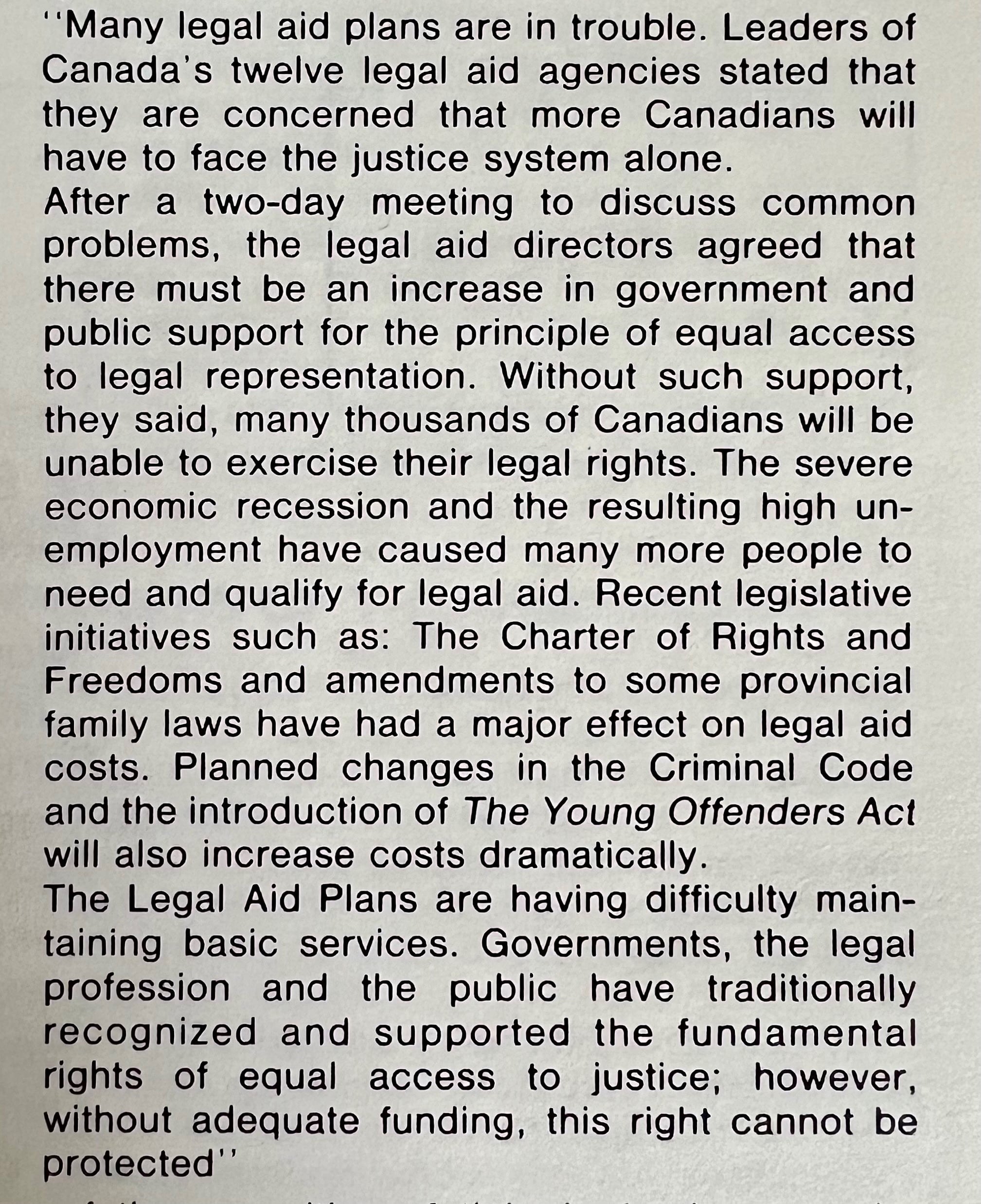

Saskatchewan Legal Aid Commission 1983-1984 Annual Report
Saskatchewan Legal Aid Commission 1983-1984 Annual Report
The Legal Aid Act Implemented
Following the release of the MacPherson Report, The Community Legal Services (Saskatchewan) Act was repealed and replaced by The Legal Aid Act. This legislation streamlined the administration of services by replacing boards, which functioned under contractual agreements, with area offices and staffed by the newly named Saskatchewan Legal Aid Commission (SLAC).
Local advisory boards will:
- have no more than 13 members, appointed by Order-in-Council;
- act as a sounding board for complaints from applicants denied legal aid services; and
- provide information and legal educational programs in their designated areas.
Legal services provided by legal aid lawyers were restricted to what is considered essential services, including:
- indictable offenses where prison time or fine expected;
- summary offenses where jail time is expected or lose their job;
- juveniles facing incarceration; and
- main focus on Criminal Code offenses and family law (divorce and child protection).
On offenses where legal representation in the courts would not be provided, the Commission would attempt to provide the accused person with information briefings over the phone.
No fee-generating civil action was to be provided, such as property transactions or lawsuits. Lawyers were also no longer to handle wrongful dismissal, municipal bylaws, name changes, workers' compensation, unemployment insurance appeals, small claims, wills and estates, and vehicle act offenses.
New System in Place to Management Legal Aid Data
The Legal Aid Management Information System (LAMIS) became operational by the end of the 1984-85 fiscal year.
Local Area Boards Folding
After 15 years, the Saskatoon Legal Assistant Clinic Society announced it would dissolve within four months. Greg Walen, board chair, resigned. Walen said the impact on clients would be a shift from mainly family and civil law to criminal cases. In 1983, the society passed a resolution that half of the lawyers would be devoted to civil cases, but after the new Act was in place they no longer had authority to make that decision. Walen also noted that women, Indigenous people and disabled groups would have less of an outlet for their legal needs.
An interim committee would be in place to oversee the dissolution and disperse the remaining funds to non-profit organizations that submit proposals (such as the Elizabeth Fry Society, John Howard Society, Integral House and A Room of One’s Own).
The North Battleford society board and other smaller boards folded when the new Legal Aid Act was proclaimed.
SLAC & CUPE Negotiations
With the implementation of The Legal Aid Act on September 1, 1983, Saskatchewan Legal Aid Commission assumed the position of immediate employer and subsequently took a direct role in negotiations. A two-year agreement was achieved on May 10, 1984.
SLAC Chair Visits Northern Court Points
The Chair of the Saskatchewan Legal Aid Commission, Ian Wilson, made a series of visits to northern court points. From these visits, the Commission created a preliminary proposal for the federal Department of Justice called The Enhancement of Public Legal Services in Northern Saskatchewan.
Young Offenders Act to Replace Juvenile Delinquents Act
The Young Offenders Act was proclaimed and to be in effect April 1985. This Act replaces The Juvenile Delinquents Act and redefines “young offender” – raises age from 16 to 18, and minimum age from 7 to 12. It stresses alternatives to confinement and guarantees legal aid services to offenders under the age of 18.
Legal Aid Leaves Justice and Moves to Department of Social Services
In the spring of 1985 the legal aid program was transferred from the Department of Justice to the Department of Social Services. The move was partially made because social services and legal aid had overlapping clientele.
Legal Aid to Act as Official Representatives for Individuals with Mental Health Issues
The Saskatchewan Legal Aid Commission entered into a contractual arrangement with the Saskatchewan Department of Health, undertaking to provide persons to carry out the duties of Official Representatives under the new Mental Health Service Act. Official Representatives provided designated services to individuals with mental health issues who were involuntarily committed.
Canadian Centre for Justice Statistics Funds SLAC Study
The Canadian Centre for Justice Statistics funded a feasibility and requirements study for a computerized Saskatchewan Legal Aid Commission’s Management Information System. The final report was due in June 1987.
CCJS Study Recommends SLAC Project
The final report by the Canadian Centre for Justice Statistics on the Saskatchewan Legal Aid Commission’s (SLAC) computerized Management Information System was released. It recommended that the SLAC expand its hardware and software capabilities. Due to financial restraint, the project was put on indefinite hold.
Legal Aid Chair Retires
Ian Wilson retired from his role as Chair with the Saskatchewan Legal Aid Commission. His eight years of service meant that at the time of his retirement he was the longest serving Chair and the only non-lawyer to head the Commission. Quentin Agnew, a Commissioner since 1979, took over as acting Chair.
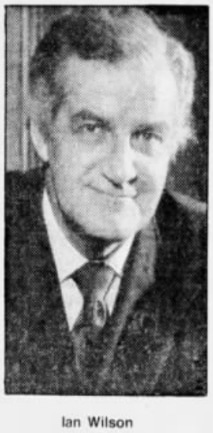

Saskatoon Star Phoenix, February 13, 1984
Saskatoon Star Phoenix, February 13, 1984
Legal Aid Plans Fees for Services
An internal memo was circulated to legal directors that outlined the Saskatchewan Legal Aid Commission’s plan to charge fees for services. This was an alternative to laying off approximately 20 staff in the face of an 8% budget cut.
The proposed fees were as follows:
- Criminal Code charge – $100
- Sexual assault or robbery – $200
- Homicide – $400
- Guilty pleas – $20
- Simple family matters – $50
- Divorces, custody, maintenance – $400
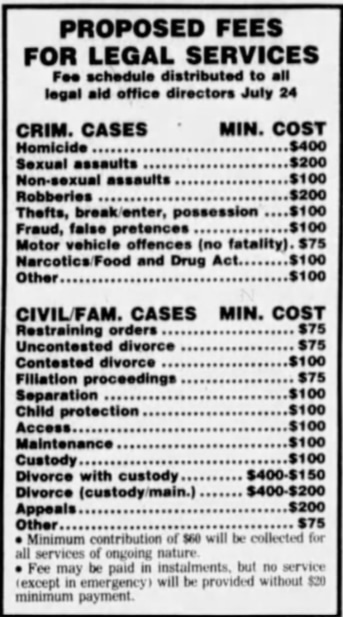

Saskatoon Star Phoenix, July 30, 1987
Saskatoon Star Phoenix, July 30, 1987
Lawyers for Equal Justice Forms
A group formed in Saskatoon to combat the Saskatchewan Legal Aid Commission's plan to charge fees for its legal services. Lawyers for Equal Justice was made up of lawyers, law professors and articling students. The group was concerned that the proposed fee structure would deter people from seeking legal services and that it might violate the Charter of Rights and Freedoms. Other concerns included the possibly remand centres would become clogged with people who could not make bail, could not afford a lawyer, or chose to plead guilty because it was cheaper than pleading not guilty.
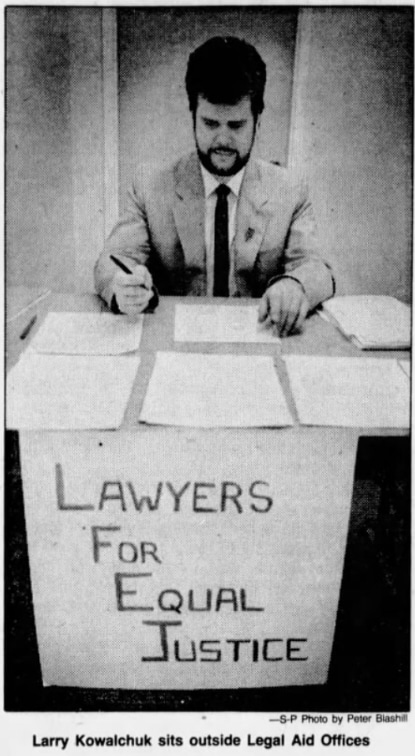

Saskatoon Star Phoenix, August 5, 1987
Saskatoon Star Phoenix, August 5, 1987
Minister Says Charging Fees for Legal Aid is Not Unrealistic


Saskatoon Star Phoenix, July 23, 1987
Saskatoon Star Phoenix, July 23, 1987
Hookers & Dealers Should Pay
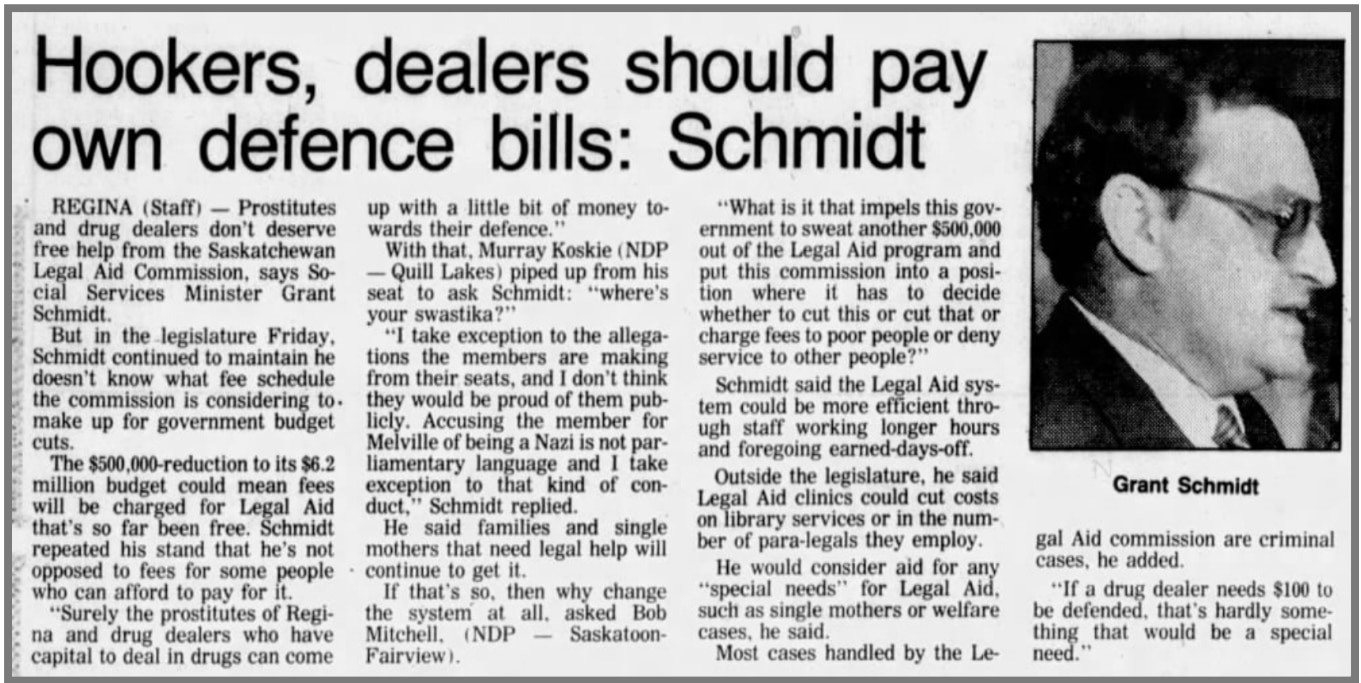

Saskatoon Star Phoenix, July 25, 1987
Saskatoon Star Phoenix, July 25, 1987
Human Rights Association Criticises Legal Aid
The Saskatchewan Association on Human Rights said the Saskatchewan Legal Aid Commission should be abolished because it would fail to fulfil its mandate by implementing user fees. President Lloyd Robertson suggested that the local boards be reestablished instead.
The Saskatchewan Action Committee, Status of Women agreed. Spokesperson Colleen Meyer said the fees would devastate low-income women who need legal services.
The John Howard Society, Regina Transition House, U of R Women’s Centre and Regina Women’s Centre all had the same concerns.
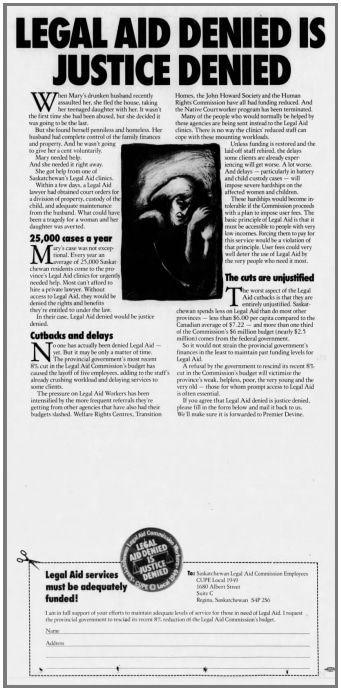

Regina Leader Post, August 1, 1987
Regina Leader Post, August 1, 1987
Contribution Policy in Place
The intense media coverage of the proposed fee structure meant the Saskatchewan Legal Aid Commission revised its plan for dealing with the budget cuts and implemented a combined fee-for-services and staff layoffs. All full-service applicants who did not receive social assistance would be asked to pay a minimum of $60 for their legal services. Legal Directors had the discretion to determine the level of contribution required and approve a payment schedule.
Ten staff vacancies were frozen and five employees were laid off.
Welfare recipients could get jobs, Schmidt declares
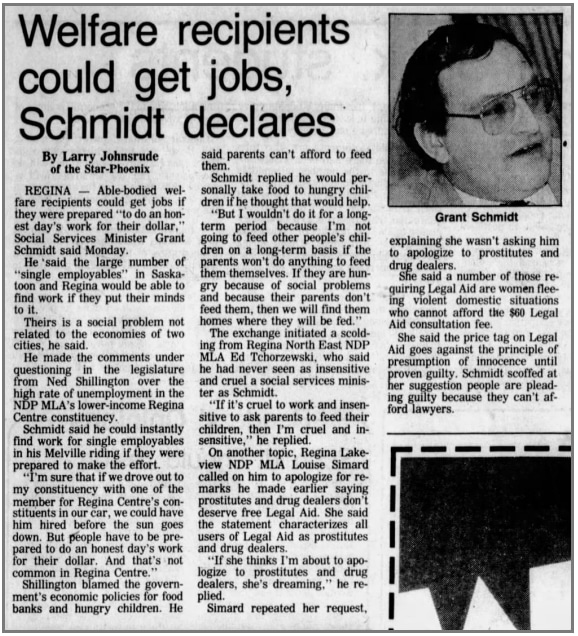

Saskatoon Star Phoenix, September 15, 1987
Saskatoon Star Phoenix, September 15, 1987
Social Justice Network and CUPE Miss Their Shot with Protest
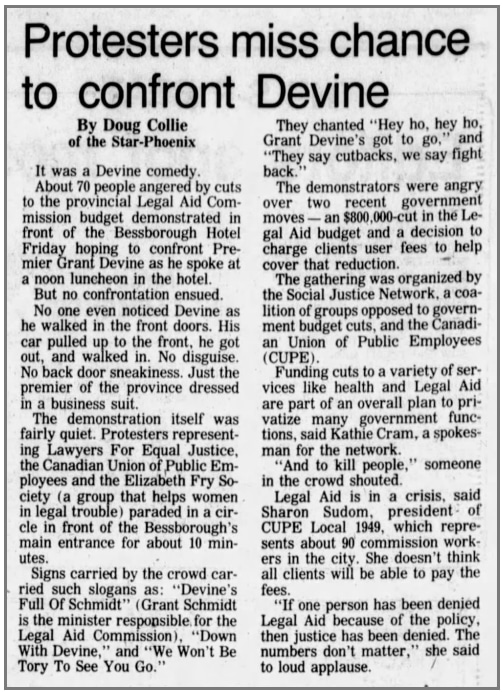

Saskatoon Star Phoenix, August 22, 1987
Saskatoon Star Phoenix, August 22, 1987
Fees Here to Stay
After three and a half months, the Saskatchewan Legal Aid Commission has decided to keep the fee structure in place, subject to further review by March 31, 1988. Since August, approximately $62,000 had been charged to clients, with $35,000 collected.
CUPE Implements Ad Campaign in Face of Government Budget Cuts
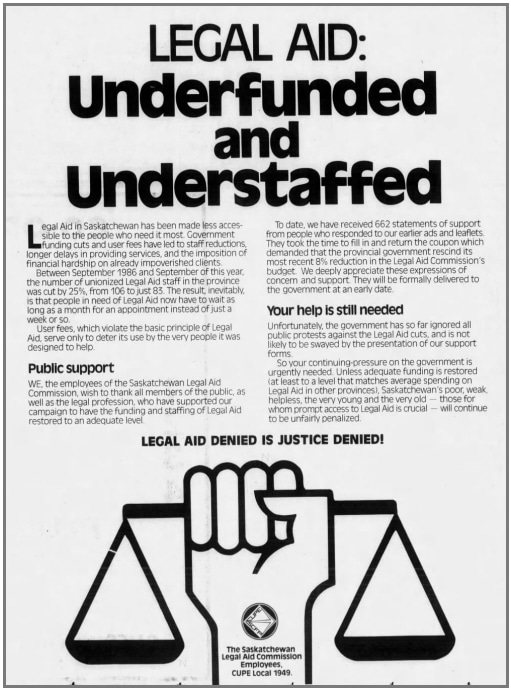

Regina Leader Post, December 5, 1987
Regina Leader Post, December 5, 1987
Fry (Elizabeth) Society of Saskatchewan Inc. v. Legal Aid Commission (Sask.)
Saskatchewan Court of Queen’s Bench dismissed an application made by the Elizabeth Fry Society that the Saskatchewan Legal Aid Commission did not have the legal authority to impose a contribution policy to its legal aid services and that only the Lieutenant Governor in Council could prescribe the rule for determining the eligibility of an applicant or class of applicants and prescribe the procedures for applying for legal services. Judge Sirois dismissed the application, noting that the Commission indeed had the authority to implement a contribution policy and that doing so fell within the legislative regulations.
The Elizabeth Fry Society appealed the decision.
Legal Aid Chair Resigns
Quenten Agnew, Chair of the Saskatchewan Legal Aid Commission, resigned from his acting Chair position after eight months on the job.
Contribution Policy and Procedure Analyzed
The Saskatchewan Legal Aid Commission analyzed the Contribution Policy and found that 14% of all full-service applications were assessed a fee. Of these fees, 75% were $60 or less. The average fee charged was $68. Fifty-eight percent of the fees had been collected by the end of the fiscal year for a total of $143,000.
New Chair of Legal Aid Commission Appointed
Don Morgan was appointed Chair of the Saskatchewan Legal Aid Commission, a position that had been vacant for four months. Morgan was a Saskatoon lawyer in private practice at the time of his appointment.
Duty Counsel Program Organized in Saskatoon
A duty counsel program organized by the Saskatoon Criminal Defense Lawyers’ Association launched in Saskatoon. Forty-five local lawyers volunteered one morning per nine weeks to assist people appearing in provincial court after being arrested overnight.
Lawyers would arrive at court, briefly interview the accused before 10 a.m. then speak on their behalf in court. The aim of the program was to talk to prosecutors about terms of release, with the hope of avoiding unnecessary remand time and bail hearings. Duty counsel also ensured that the accused knew what to expect during a first court appearance.
Don Morgan says the Saskatoon Criminal Defense Lawyers’ Association duty counsel program is a supplement to the legal aid program, which likely wouldn’t be expanded.
The province discontinued the native courtworker program in 1987 which led to more people being confused when entering court.
Appeal Court Rules Legal Aid Fees Unlawful
The Saskatchewan Court of Appeal overturned the Court of Queen’s Bench decision in the case of the Elizabeth Fry Society of Saskatchewan Inc. v. The Saskatchewan Legal Aid Commission. The decision stated SLAC did not have the jurisdiction to charge contribution fees for legal aid services and must stop doing so immediately.
In the 1987-1988 fiscal year, $140,000 in user fees was collected, and another $140,000 was written off after the Commission failed to collect.
Legal Aid Lawyers Cease Roles as Official Representatives
Since April 1, 1986, Saskatchewan Legal Aid Commission lawyers have provided services to individuals involuntarily committed for treatment in mental hospitals in Saskatchewan.
Legal Aid Act Amended
The Legal Aid Act was amended to clarify the assessment and collection of contributions.
All legal aid plans in Canada except for PEI and Northwest Territories charged fees for legal aid services. The amendment gave the Saskatchewan Legal Aid Commission the official authority to levy fees. It also removed restrictions on legal aid work that could be done by private lawyers. The amendments also established a committee to hear appeals from people denied legal aid or forced to make a contribution.
Long-Awaited DPA Review Released
The DPA Review was released. This report examined the Saskatchewan Legal Aid Commission and its effectiveness.
The report noted that legal aid lawyers provided excellent service, even with their heavy caseload and concerns over low morale. Seventy percent of clients were highly satisfied with their service.
The report acknowledged that there were some people falling through the cracks – the working poor. It recommended that the Commission increase the ceiling on how much money an individual could earn and still be eligible for legal aid services. There were people who were eligible for legal aid but didn’t receive services because the services are no longer provided through the clinics. Therefore, the report strongly urged more funding for the legal aid program.
The findings did not discount a contribution scheme, and suggested that the guidelines be reviewed and established on a sliding scale basis similar to determining child tax.
“Legal aid is not a luxury, it is a basic right. It is an essential part of a social safety net.” – Daniel Ish, Chair of DPA Oversight Committee
First Legal Aid Lawyer Receives Queen’s Counsel Designation
Peter Kolenick, a lawyer with the Saskatchewan Legal Aid Commission’s Yorkton Area Office, was given the designation of Queen’s Counsel. Kolenick was the first legal aid lawyer in the province to receive this recognition.
Law Foundation of Saskatchewan Approves Computerization Grant for SLAC
The Saskatchewan Legal Aid Commission applied for a grant through the Law Foundation of Saskatchewan for its proposed computerization project. This project was planned with the intent of streamlining statistical analysis and standardized data collection throughout the province. The LFS approved the $489,500 application, and work on the project was expected to take many months.
New Tariff for Private Bar Solicitors
The Saskatchewan Legal Aid Commission implemented a revised tariff of fees to use where the Commission appoints a private practice lawyer.
SLAC Establishes EAP Program with CUPE
The first Employee Assistance Program (EAP) was introduced to Saskatchewan Legal Aid Commission employees, jointly funded by CUPE. SLAC also introduced a deferred salary leave plan designed to “rejuvenate” and “invigorate” staff. In the 1990-1991 Annual Report, it was noted that this program was well used.
Private Firm Hired for 24-hour Duty Counsel
The Saskatchewan Legal Aid Commission stopped providing 24-hour duty counsel pursuant to the Supreme Court decision in R. v. Brydges. SLAC entered into a contract with a private firm to supply the services.
SLAC Chair Receives Queen's Counsel Designation
Don Morgan, Chair of the Saskatchewan Legal Aid Commission, received Queen's Counsel designation.
Roy Romanow Elected Premier of Saskatchewan
Roy Romanow, New Democrat Party MLA for Saskatoon Riversdale, was elected the 12th premier of Saskatchewan.